




一篇平淡无奇的作文,尽管没有错误,却拿不到高分。所以,在保证正确性的前提下,考生的作文必须要有出彩之处才能得到阅卷老师的青睐。为了使作文脱颖而出,最有效的办法就是在作文中使用同义词,以避免文章单调。为此,我们整理了专四写作中常用的115个词的同义词替换,以帮助考生高效备考。
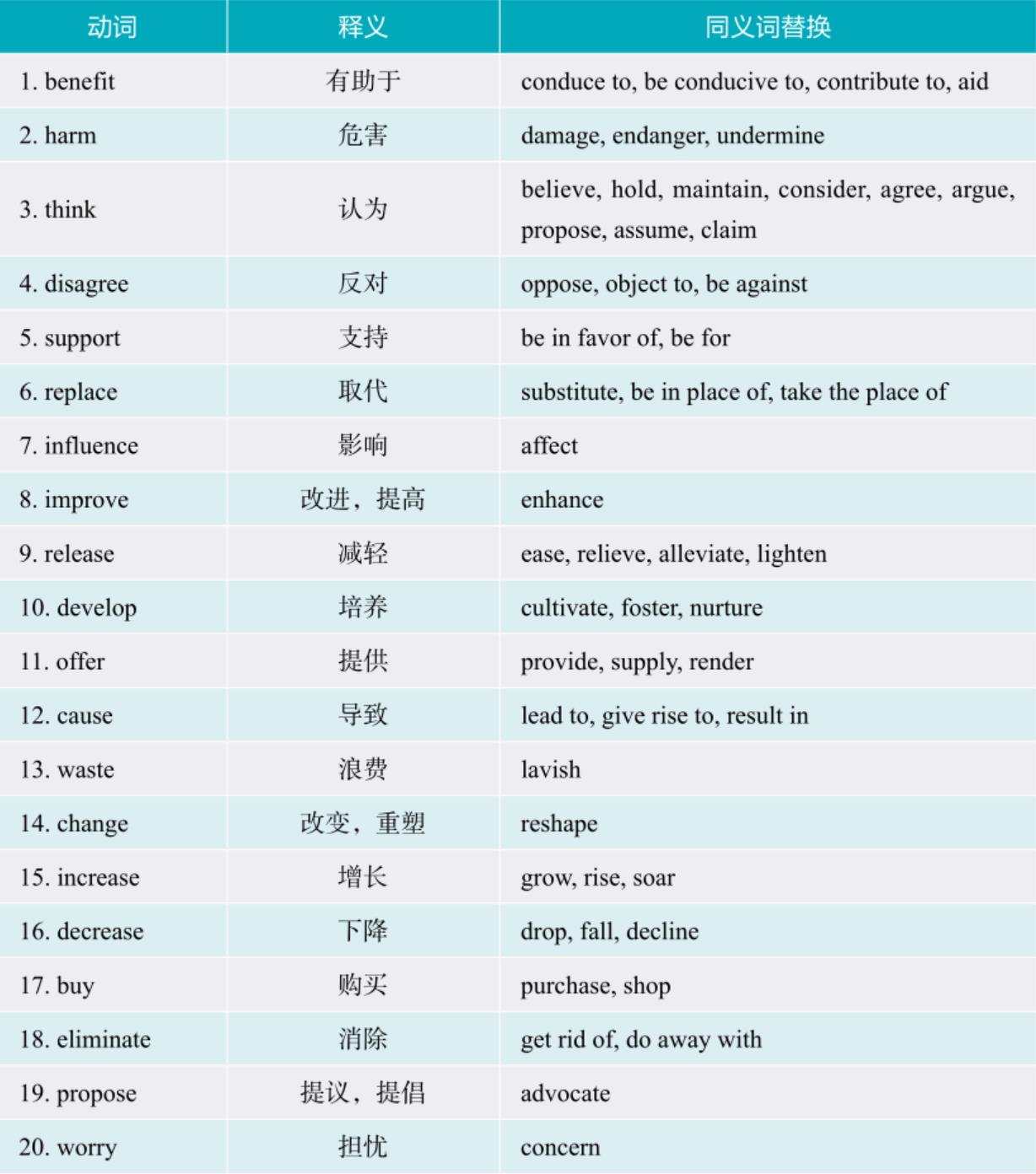
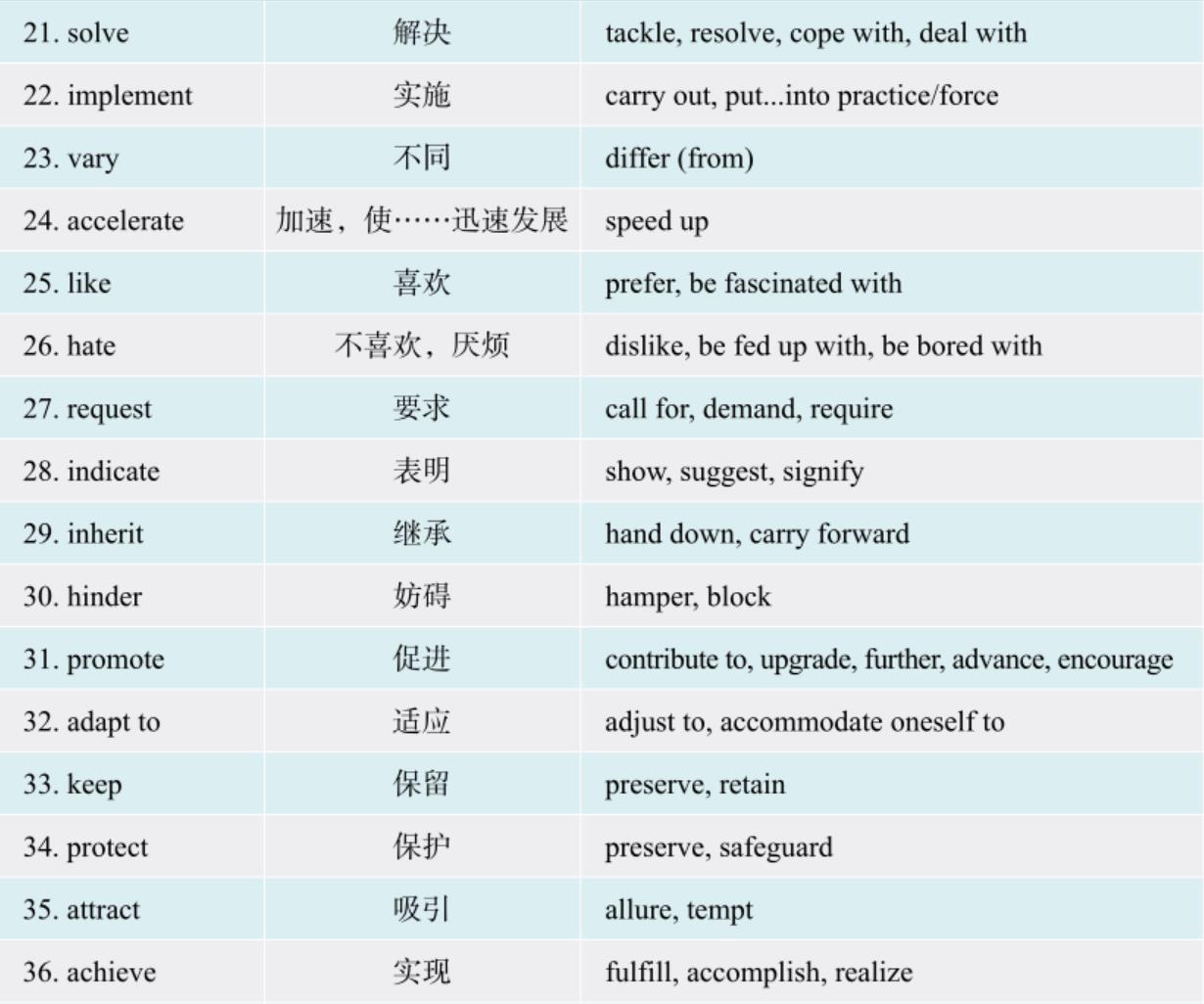
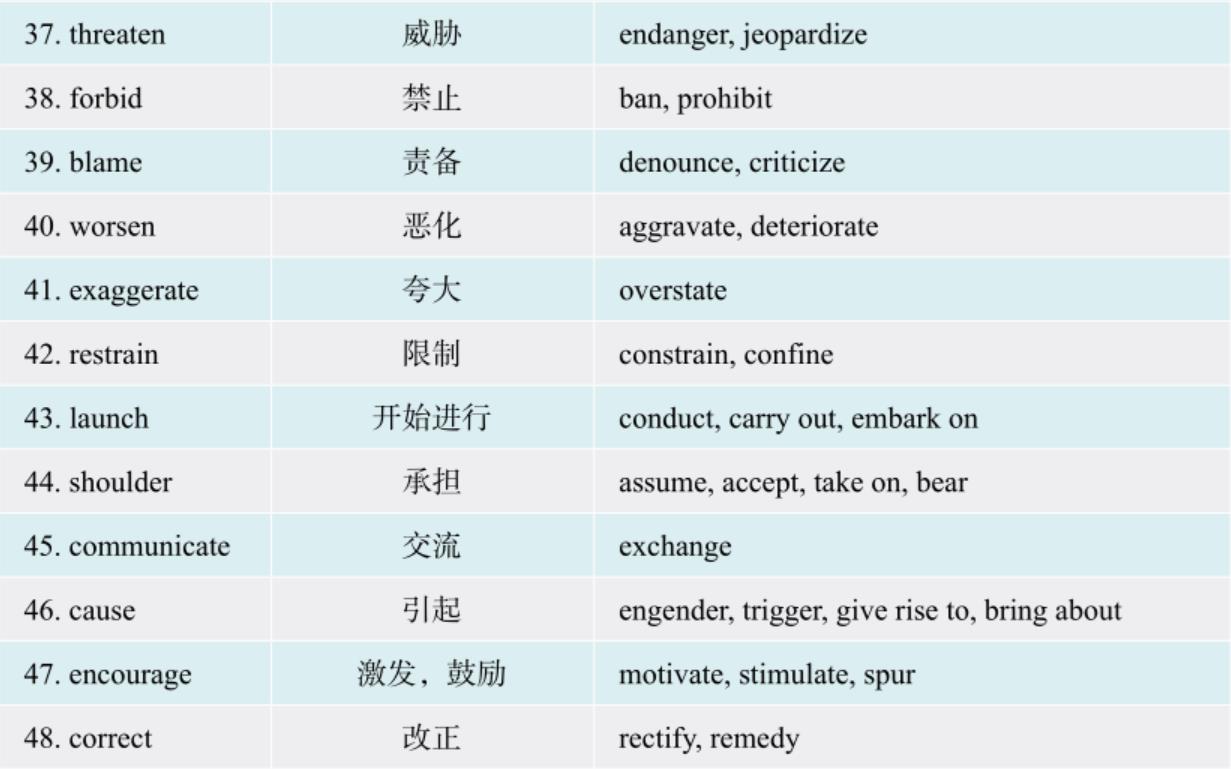
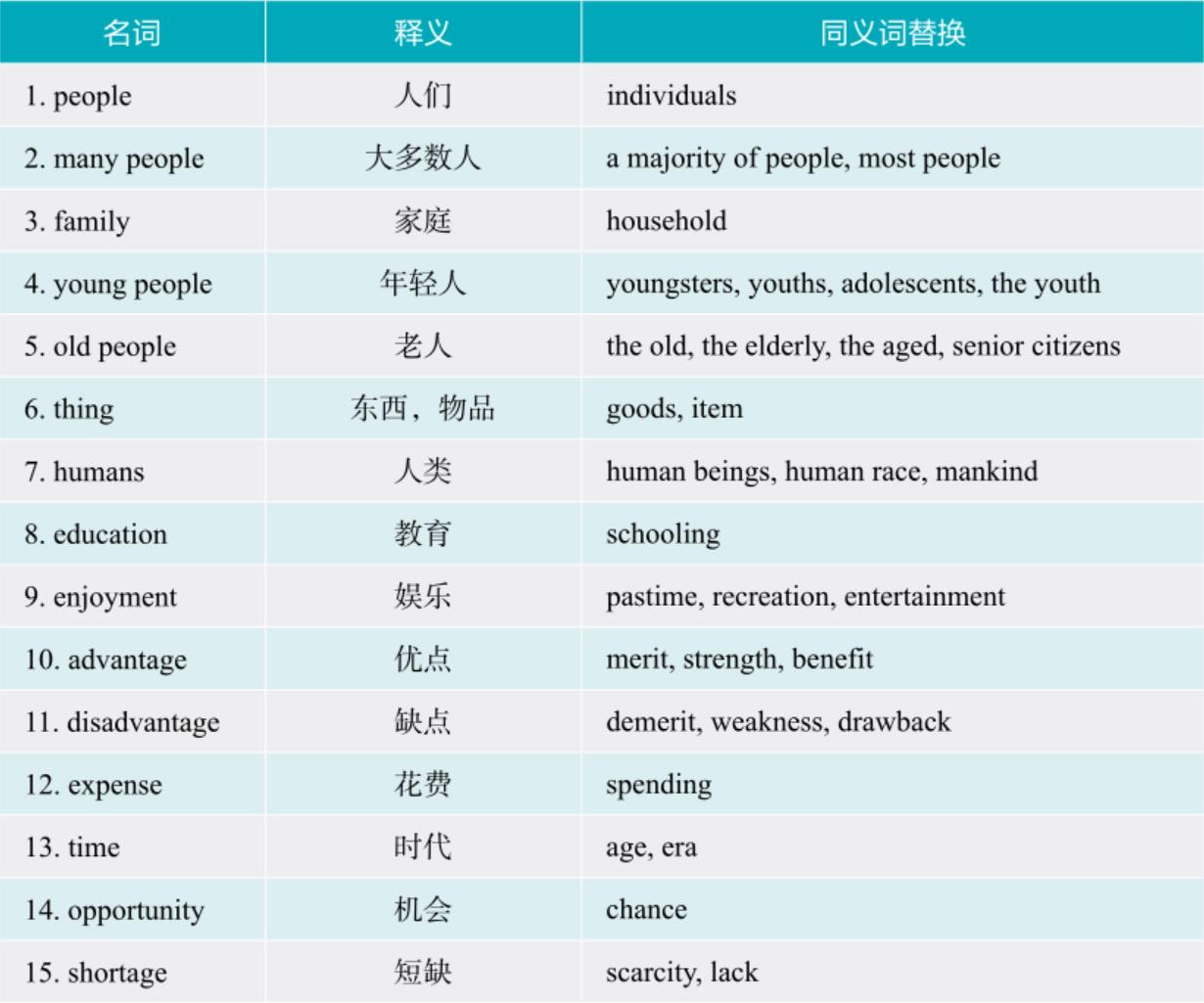
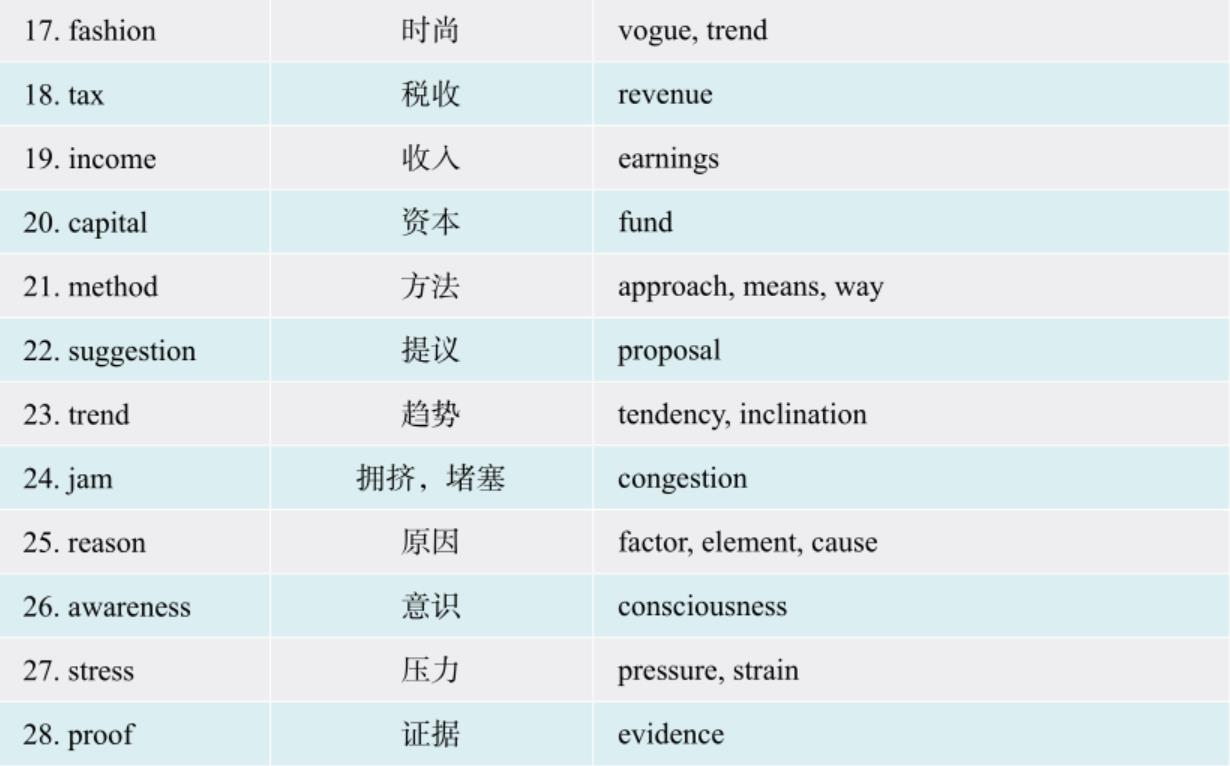
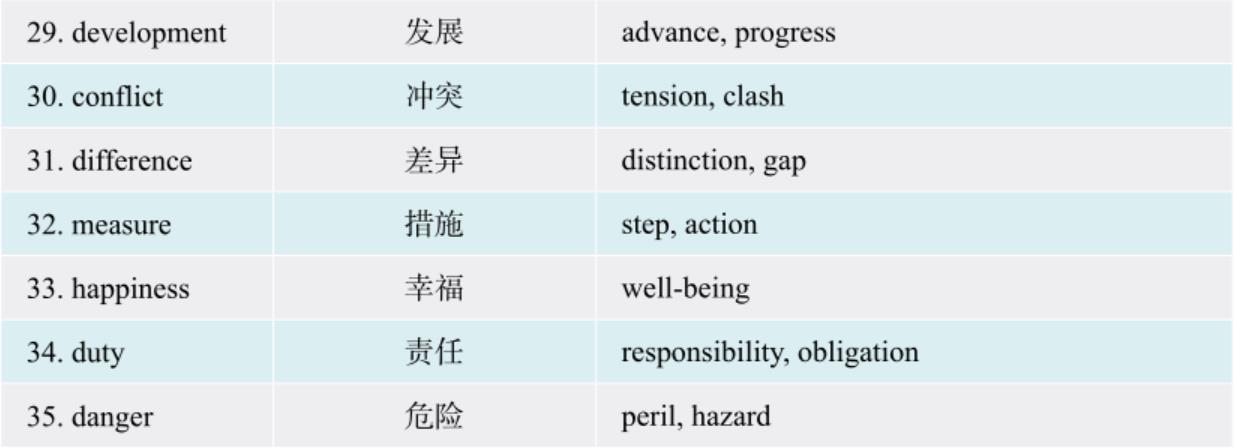
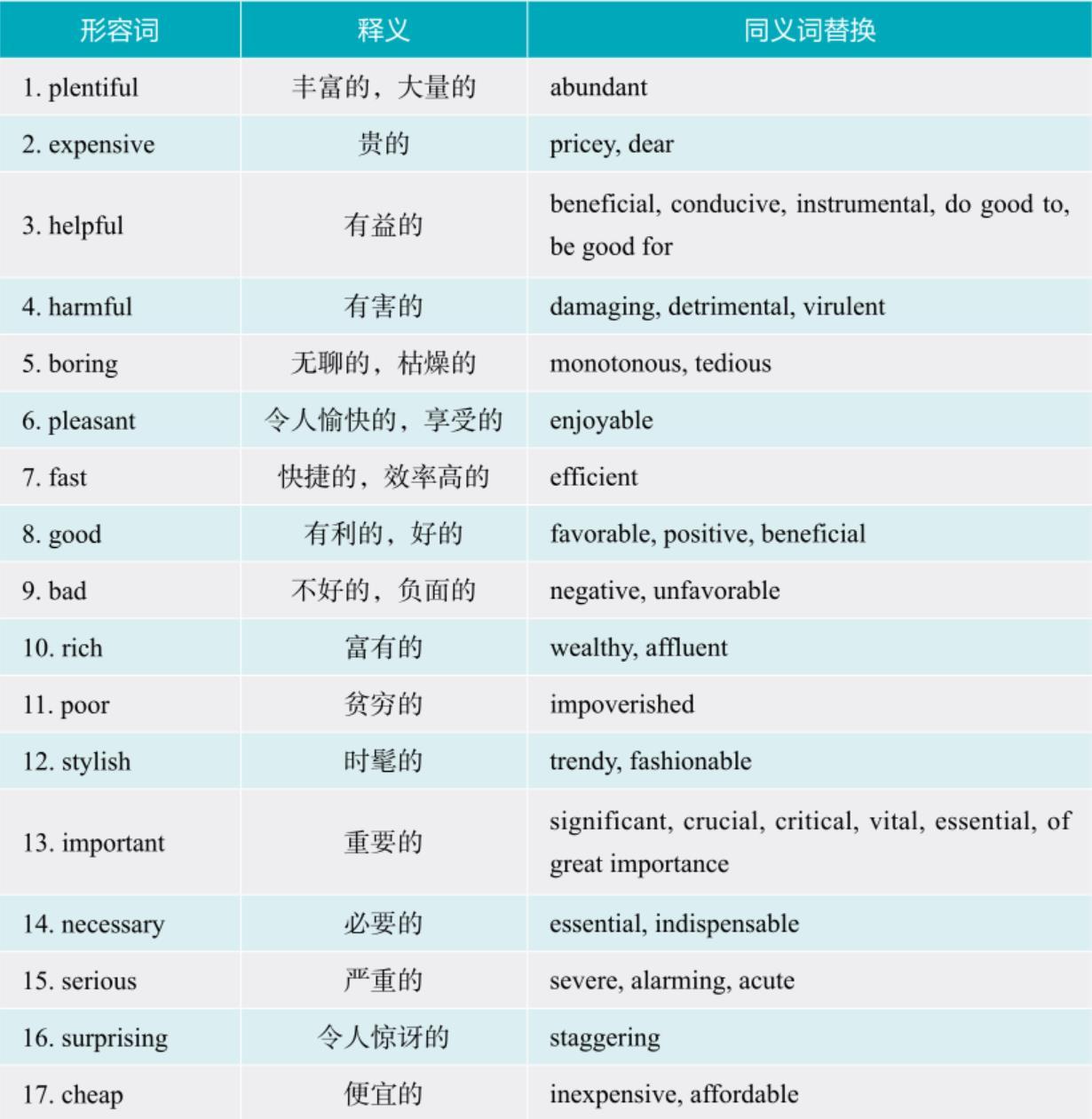
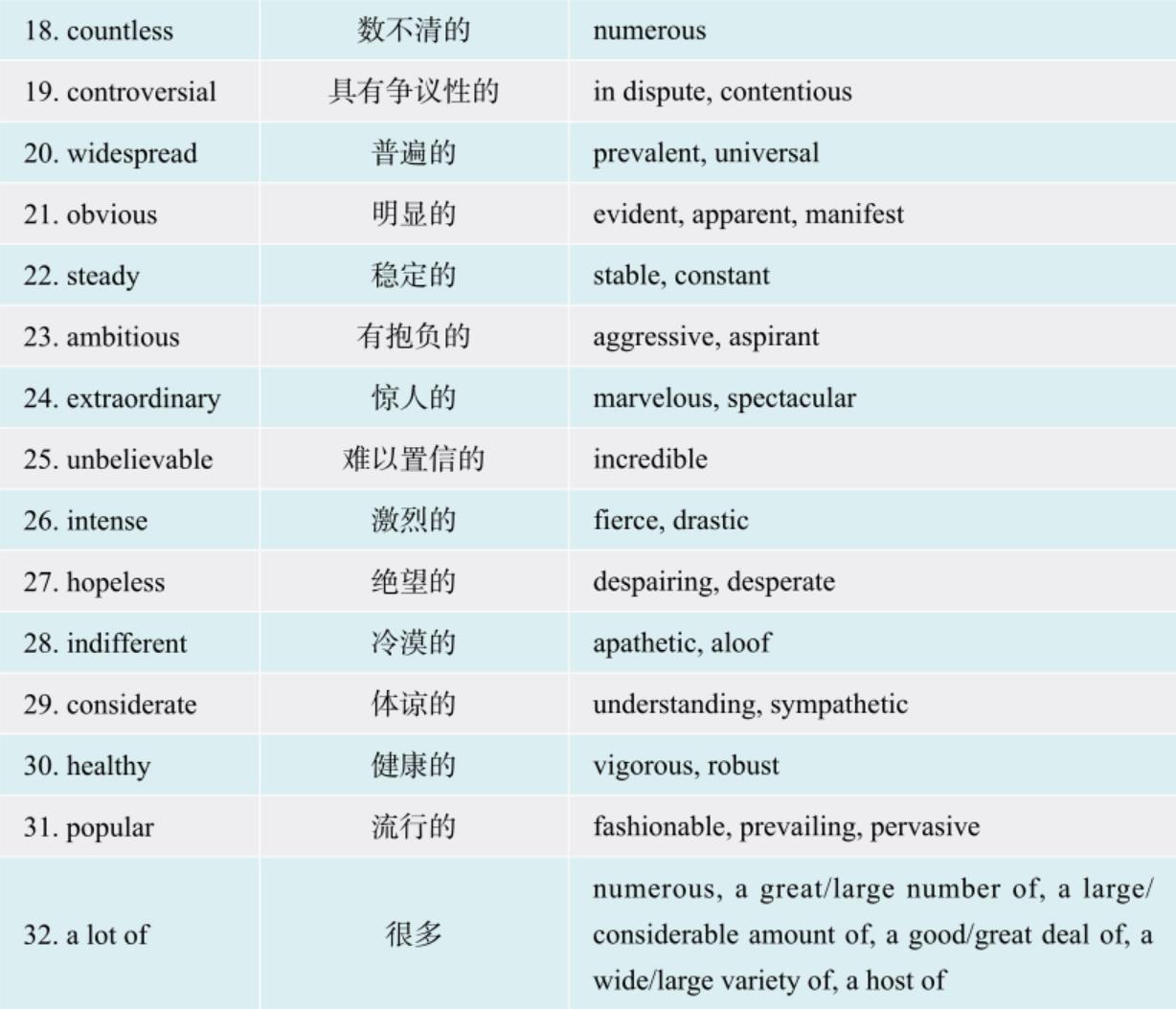
专四写作中的常见话题可以归纳为6类——社会生活、文化教育、科技、环保、校园生活和工作就业。在写作备考时,考生可分话题进行词汇储备。要想写好作文,日常积累不能少。
 社会生活类
社会生活类
● alleviate burdens 减负
● bridge the gap 缩小差距
● campus safety 校园安全
● classic works 经典名著
● cut-throat competition 激烈的竞争
● cyber economy 网络经济
● driverless vehicles 无人驾驶汽车
● excessive consumption 过度消费
● food delivery 外卖
● food safety 食品安全
● healthy lifestyle 健康的生活方式
● information age/era 信息时代
● information safety/security 信息安全
● Internet surfing 网上冲浪
● knowledge economy 知识经济
● mass media 大众媒体
● media supervision 舆论监督
● medical insurance 医疗保险
● mobile payment 移动支付
● online economy 线上经济
● online medical service 在线医疗服务
● online shopping 网购
● physical exercise 体育锻炼
● population aging 人口老龄化
● population explosion 人口激增
● pressure of urban life 城市生活压力
● prime time 黄金时段
● privacy protection 隐私保护
● public infrastructure 公用基础设施
● shared bikes 共享单车
● shoot video clips 拍短视频
● social distance 社交距离
● social interaction 社交
● social media 社交媒体
● social welfare 社会福利
● spiritual civilization 精神文明
● sustainable development 可持续发展
● Internet security 网络安全
● Internet supervision 网络监管
● traffic congestion 交通拥堵
● urbanization 城市化
● video-sharing apps 视频分享应用程序
● virtual life 虚拟生活
● ways of consumption 消费方式
 文化教育类
文化教育类
● a sense of belonging 归属感
● a sense of national pride 民族自豪感
● alleviate the burden on students 给学生减负
● aptitude (学习方面的)才能;天资
● broaden one's horizons 拓宽视野
● compulsory education 义务教育
● cross-cultural communication 跨文化交流
● cultural diversity 文化多元性
● cultural shock 文化冲击
● development of one's personality 个性发展
● education for all-around development 素质教育
● enrich/enlarge one's knowledge 丰富知识
● experienced 富有经验的
● extra-curricular 课外的
● fulfill one's potential 发挥潜能
● high cost of living 高昂的生活成本
● higher education 高等教育
● home/family education 家庭教育
● Hope Project 希望工程
● improve one's capabilities 提高某人的能力
● intensive training courses 集训课程
● interdisciplinary talents 复合型人才
● learn basic skills 学习基本技能
● life-long/life-time study 终身学习
● local customs and practices 风土人情
● online courses 在线课程
● online education 在线教育
● open class 公开课
● personal interests 个人兴趣
● potential 潜在的;潜力
● practical capability 实际能力
● quality-oriented education 素质教育
● rich cultural heritage 丰富的文化遗产
● set a positive example 树立积极榜样
● stimulate 刺激,激励
● student loan 助学贷款
● teaching method 教学方法
● test-oriented education 应试教育
● theory and practice 理论与实践
● traditional culture 传统文化
 科技类
科技类
● a double-edged sword 一把双刃剑
● advancement in science and technology 科技进步
● artificial intelligence 人工智能
● be addicted to sth. 对某物上瘾
● big data 大数据
● digital products 数码产品
● double impacts 双重影响
● energy saving and environmental protection 节能环保
● globalization 全球化
● improve the efficiency 提升效率
● information technology 信息技术
● make rational use of sth. 合理利用某物
● portable computers 笔记本电脑
● science and innovation 科技与创新
● sharing economy 共享经济
● shopping platforms 购物平台
● shorten the distance 缩短距离
● social networking websites 社交网站
● technological products 科技产品
● virtual things 虚拟事物
 环保类
环保类
● call for 呼吁
● air pollution 空气污染
● carbon dioxide 二氧化碳
● clean renewable energy 可再生清洁能源
● climate change 气候变化
● comprehensive treatment 综合治理
● deforestation 乱砍滥伐
● desertification 沙漠化
● suspended particles 悬浮颗粒物
● detrimental 有害的
● disposable chopsticks 一次性筷子
● drain of energy and resources 能源和资源消耗
● enhance environmental awareness 加强环保意识
● environmental damage 环境破坏
● environmental deterioration 环境恶化
● environmental pollution 环境污染
● environmental protection 环境保护
● excess reclamation 过度开垦
● forest coverage rate 森林覆盖率
● garbage classification 垃圾分类
● global warming 全球变暖
● green energy 绿色能源
● keep ecological balance 保持生态平衡
● noise pollution 噪音污染
● non-renewable resources 不可再生资源
● pollutants 污染物
● pollution-free fuel 无污染燃料
● put/place the blame on 归咎于
● recycling and reuse 回收再利用
● sustainable development strategy 可持续发展战略
● throw/discard trash/rubbish/garbage 丢弃垃圾
● undermine 逐渐破坏
● vicious circle 恶性循环
● waste disposal 废物处理
● water scarcity 水资源短缺
 校园生活类
校园生活类
● after-school/extra-curricular activities 课外活动
● allowance 津贴,零用钱
● application form 申请表
● boarder 住校生
● cafeteria 自助小餐厅
● call slip 借书单
● day pupil 走读生
● dean 系主任
● deposit money in a bank 存钱
● dining hall 食堂
● dormitory 宿舍
● dormitory building 宿舍楼
● enrolment 登记,注册
● graduate school 研究生院
● graduation ceremony 毕业典礼
● gym 健身房
● internship 实习
● lecture hall 演讲厅,报告厅;阶梯教室
● letter of recommendation 推荐信
● library card 借书卡
● live off campus 住在校外
● live on campus 住在校内
● military training 军训
● optional courses 选修课程
● oral examination 口试
● part-time job 兼职工作
● peer 同龄人
● placement service 就业办公室
● postgraduate 研究生
● required/compulsory courses 必修课程
● social practice 社会实践
● student canteen 学生食堂
● student ID card 学生证
● student union 学生会
● take an examination 参加考试
 工作就业类
工作就业类
● a bright/promising future 光明的前途
● a state-owned enterprise 国有企业
● a well-paid job 一份高薪工作
● a work addict 工作狂
● await job assignment 待岗
● basic/essential qualities 基本素质
● career guidance 就业指导
● choose the right career 正确择业
● commute 通勤
● employment and unemployment 就业与失业
● flow of personnel 人才流动
● full/adequate preparation 充分准备
● ideal workplace 理想的工作场所
● improve personal skills 提升个人能力
● iron rice bowl 铁饭碗
● job applicants/hunters 求职者
● job hopping 跳槽
● job market 就业市场
● job responsibilities 工作职责
● job satisfaction 工作满足感
● job-waiting 待业
● keep skills up-to-date 不断更新技能
● kindred spirit 志同道合的人
● laid-off workers 下岗工人
● learn to cooperate and comprise 学习合作和妥协
● long-term development targets 长期发展目标
● offer more job opportunities 提供更多就业机会
● practical skills 实用技能
● professional development 职业发展
● professional ethics 职业道德
● seize the opportunity 抓住机遇
● significant 有意义的,重大的
● spirit up 激励
● start one's own business 创业
● suit personal needs 满足个人需要
● switch jobs 换工作
● team work spirit 团队合作精神
● unemployment 失业
● unhealthy tendency 不正之风
● upgrade oneself 提升自我
● work overtime 加班
● workaholic 工作狂
● work environment 工作环境
● work experience 工作经验
● work pressure 工作压力
上一章中我们讲过专四写作段落的展开,而本小节为考生提供3大段落的必备句型,帮助考生快速建立起写作的基本框架。需要注意的是,考生不能只是单纯地背诵句子,更应该在练习时模仿句型,活学活用,形成自己的语言风格。
 开头段必备句型
开头段必备句型
★ 引出话题
(1) Nowadays, there is a growing concern over ______.
如今,人们越来越关注______。
(2) Recently, the influence of ______ has attracted much public attention.
最近,______的影响引起了公众的广泛关注。
(3) Recently, the problem has been brought into focus.
最近,这一问题已成为(人们)关注的焦点。
(4) Nowadays, an increasing number of ______ are interested in ______.
如今,越来越多的______对______感兴趣。
(5) These days, a growing number of ______ choose to ______.
现在,越来越多的______选择______。
(6) ______ has long been a hotly debated topic on which ______ hold divergent views.
长期以来______一直是一个争论不休的话题,______对此持有不同的观点。
(7) There is no denying that we're living in a world full of ______.
不可否认,我们生活在一个充满______的世界。
(8) It seems that ______ nowadays are more ______ to ______ as they realize that ______.
如今的______似乎对______更______,因为他们意识到______。
(9) Recently, ______ has gone viral all over the world, particularly in ______.
最近,______在全世界传播开来,特别是在______。
(10) Despite the increase of ______ and more public concern, some are worried about ______.
尽管______有所增加,公众也越来越关注,但一些人对______感到担忧。
(11) With the development of science and technology, ______ has already become a popular means of communication.
随着科学技术的发展,______已经成为一种流行的交流工具。
(12) Recently, ______ has aroused great concern among ______.
最近,______引起了______的极大关注。
(13) The issue of whether ______ has aroused wide concern.
是否______的问题引起了广泛的关注。
(14) Many nations have been faced with the problem of ______.
许多国家都面临着______的问题。
(15) This phenomenon has begun a debate about whether or not ______.
这一现象引发了一场关于是否______的讨论。
★ 概述材料观点
(1) Recent studies indicate that ______.
最近的研究表明______。
(2) There is sufficient evidence to show that ______.
有足够的证据表明______。
(3) According to ______, it can be seen that ______.
根据______,可以看出______。
(4) Faced with ______, quite a few people argue that ______.
面对______,很多人认为______。
(5) People have voiced different opinions about ______.
人们对______持有不同的观点。
(6) The question of ______ is often met with diverse answers.
针对______问题,有各种不同的答案。
(7) There was a significant difference of opinion among ______ as to whether ______ or not.
针对是否______,______持有非常不同的观点。
(8) Many people embrace the idea that ______, which is critical to ______. But some hold opposing views on this matter. They argue that ______.
许多人认为______,这是______的关键。但有些人对此事持反对意见。他们认为______.
(9) Some people, such as ______, believe that ______. But others point out that ______ has had a detrimental impact on the whole society. It may result in ______.
一些人,如______,认为______。但也有人指出,______对整个社会产生了不利影响。它可能导致______。
(10) When asked whether ______ is good for ______, ______ and ______ hold different views.
当被问及______是否有利于______时,______和______持有不同的观点。
(11) When asked about ______, the majority would ______. Others, however, support ______ .
当被问到有关______的问题时,大多数人会______。然而,其他人则支持______。
(12) When faced with ______, quite a few people claim that ______, but other people think of ______ as ______.
面对______时,很多人声称______,但其他人则认为______是______。
(13) Nowadays, some may hold the opinion that ______. But others have a negative attitude.
如今,有些人可能认为______。但是其他人则持消极态度。
(14) People in different ______ tend to value different things.
______不同的人往往看重的东西不同。
(15) The fact that ______ is clearly shown by ______.
______清晰地表明了______这一事实。
(16) These facts support the conclusion that ______.
这些事实都能证明______这一结论。
(17) Perhaps we are accurate in saying, therefore, that ______.
因此,或许更确切地说,______。
★ 表明自己的观点
(1) I strongly agree with the contention that ______.
我十分赞同______的看法。
(2) Speaking for myself, I take sides with the view that ______ .
就我而言,我赞成______的观点。
(3) Personally, ______ should be kept as an option; meanwhile, ______.
在我看来,______应该作为一种选择;同时,______。
(4) Personally, I think that ______, if ______, will probably depart from their original intentions.
就我个人而言,我认为如果______,______很可能会背离其初衷。
(5) From where I stand, I believe ______ has a positive effect on ______.
从我的立场来看,我认为______对______有积极的影响。
(6) In my view, the problem doesn't lie in ______, as ______. The problem is ______.
在我看来,问题不在于______,因为______。问题在于______。
(7) Contrary to what is widely accepted, I maintain that ______.
与普遍看法相反,我坚持认为______。
(8) In my opinion, as is the case with many issues, both sides have negative as well as positive effects.
在我看来,和其他许多问题一样,双方都有积极和消极的影响。
(9) If I were forced to agree with one of the two methods, my choice would be for ______.
如果非让我从两种方法中选一个,那么我的选择是______。
(10) But to be frank, I cannot agree with them for the following reasons.
但坦白讲,出于以下原因,我不同意他们的看法。
(11) Despite the fact that the majority hold the opinion that ______, I doubt whether it is essential for ______.
尽管大多数人认为______,我怀疑对______来说,它是否必要。
(12) As far as I am concerned, I have a preference for A over B.
就我而言,比起B,我更喜欢A。
 主体段落必备句型
主体段落必备句型
★ 多项论证
(1) First of all, ______. As a matter of fact, ______. Secondly, it is believed that ______, as the old saying goes“______”. Last but not least, ______.
首先,______。事实上,______。其次,人们认为______,正如俗话所说“______”。最后但同样重要的是,______。
(2) Above all, ______. Secondly, people are engaged in ______ so that ______. This would ultimately lead to ______. Thirdly, we can't ignore the fact that ______ has dreadful effects on ______. There are a series of interrelated consequences, such as ______, etc.
首先,______。其次,人们忙于______,所以______。这最终会导致______。第三,我们不能忽视这一事实:______对______有可怕的影响,会产生一系列相互关联的后果,比如______等。
(3) Firstly, ______. Secondly, ______. Lastly, ______ is not the only way to ______. ______ should be regarded as ______ and also ______ should be paid more attention.
首先,______。其次,______。最后,______并不是______的唯一方法。______应该被视为______,同时也应该更加重视______。
(4) On the one hand, we have observed that ______, especially ______. It is said that ______. On the other hand, the original purpose of ______ is to ______. Accordingly, what we should focus on is ______.
一方面,我们注意到______,尤其是______。据说,______。另一方面,______的初衷是______。因此,我们应该关注的是______。
(5) The commonly accepted wisdom is that ______. In particular, ______. Additionally, ______. Apart from ______, ______. Furthermore, ______ do have strengths such as ______, but they also bear higher risk of ______, which may render ______.
人们普遍认为,______。特别是,______。此外,______。除了______外,______。此外,______确实有______等优势,但他们也有较高的______风险,这可能会导致______。
(6) There is no denying that ______. Additionally, ______. That is where ______ has a part to play. ______ helps ______ learn in a more effective way and motivates them to work harder on ______.
不可否认,______。此外,______。这就是______发挥作用的地方。______帮助______以更有效的方式学习,并激励他们在______上更加努力。
(7) It is admitted that to some extent, ______ is indeed a good way to ______, because ______. In the meantime, ______ leads to ______, which will ______. However, as for me, the downside of ______ is more dominant.
人们承认,在某种程度上,______确实是______的好方法,因为______。同时,______导致______,这将______。然而,对我来说,______的负面影响更明显。
★ 举例论证
(1) A good case in point is ______.
一个很好的例子是______。
(2) ______ is often cited as an example.
人们经常以______为例。
(3) A particularly notable case of this matter is ______.
这件事的一个尤其显著的例子是______。
(4) The best example of the importance of ______ that comes to my mind is ______.
我想起的体现______重要性的最佳例子是______。
★ 阐述理由
(1) There are several reasons why ______.
为什么______,有几点原因。
(2) I feel that the most important reasons are as follows: ______.
我认为最重要的原因有如下几点:______。
(3) The main reason for my propensity for ______ is that ______.
我倾向于______的主要原因是______。
(4) One of the primary causes is that ______.
主要原因之一是______。
(5) The main reason why I disagree with the above statement, however, is that ______.
但是,我不同意上述说法的主要原因是______。
(6) Beyond obvious reasons, however, there lies a deep-seated cause.
然而,除了显而易见的原因外,还有深层次的原因。
(7) Certainly, no other reason for my decision is more crucial than the one as follows.
当然,在我的决定中,没有其他理由比下面这个理由更重要。
(8) A more essential factor why I advocate the argument of ______ is that ______.
我赞成______这个观点的一个更重要的原因是______。
(9) Another reason why I disagree with the above statement is that I believe that ______.
我不同意上述说法的另一个原因是,我认为______。
(10) There is another factor that deserves some words here.
还有另一个原因值得在这里一提。
(11) The reason why I disapprove of ______ lies in ______.
我反对______的原因在于______。
★ 解释说明
(1) No one could neglect/deny the fact that ______.
没有人可以忽略/否认______这一事实。
(2) ______ is certainly true if ______ is considered.
如果考虑______,______当然是正确的。
(3) It might be noted that ______.
应该指出的是______。
(4) What is also worth noticing is that ______.
同样值得注意的是______。
(5) Similarly, these reasons are also valid when we consider that ______.
同样,当我们考虑______时,这些理由也是成立的。
(6) As an illustration, we may take ______.
作为说明,我们可以采取______。
(7) This is what we are unwilling to see, so some ways must be found out to ______.
这是我们不愿看到的,因此必须找到______的一些方法。
(8) To get a sense of ______, we must turn first to the causes of it and what benefits/harm/problems it has brought to our society.
要了解______,我们必须首先了解它产生的原因以及它给我们的社会带来的好处/危害/问题。
(9) Although ______ is probably the most important determinant, it is not the only explanation for ______.
尽管______可能是最重要的决定因素,但它并不是______的唯一原因。
(10) The undeniable deficiency in the remark is the neglect of the bare fact that ______.
这个言论不可否认的缺陷是,它忽略了______这一明显事实。
(11) Unfortunately, things have worsened/developed to the point where ______.
不幸的是,情况已经恶化/发展到了______的地步。
(12) Some people say ______. But it does not hold water.
有人说______。但是它是站不住脚的。
(13) The main problem is that it is ignorant of the basic fact that ______.
主要问题在于,它不了解______这一基本事实。
(14) Fortunately, however, more and more people come/begin to realize that ______.
然而,幸运的是,越来越多的人开始意识到______。
★ 丰富内容
(1) We need to take ______ advice with caution.
我们必须谨慎地采纳______的建议。
(2) It is also worth mentioning that ______.
还值得一提的是______。
(3) ______ would be excellent preparation for their future careers.
______将为他们将来的职业生涯做好充分的准备。
(4) Spending time and energy on anything apart from ______ is simply a waste of time, energy and money.
把时间和精力花在除______以外的任何事情上都只是浪费时间、精力和财力。
(5) ______ must possess a lot of qualities, such as ______.
______必须拥有许多品质,比如______。
(6) Whether or not we notice or realize it, ______ is influencing our society in many ways.
无论我们有没有注意或意识到,______正在影响我们社会的诸多方面。
(7) ______ requires that we continue learning to keep up with new information.
______要求我们不断学习以及时了解新的信息。
(8) ______ can extend our scope of knowledge.
______能拓宽我们的知识面。
(9) ______ may not be eliminated in the severe competition in the era of the information explosion.
______在信息爆炸时代的激烈竞争中可能不会被淘汰。
(10) ______ so that they can prepare themselves for and cater to a fast-moving society.
______,以便他们能做好准备来适应快速发展的社会。
(11) As is often the case, the best solution lies somewhere in the middle.
通常就是这样,最好的解决方法是两者各取一半。
(12) Admittedly, under some circumstances ______ can be counterproductive to ______.
不可否认,在某些情况下,______可能对______有相反的作用。
(13) I would caution that extending ______ too far might risk ______.
我想提醒的是,把______拓展得太远的话可能会有______的风险。
(14) ______ is part of a universal ethos that we commonly refer to as ______.
______是人们普遍推崇的精神品质的一部分,我们通常称之为______。
(15) Crossing the fine line between ______ and ______ can lead to ______.
超越了______与______间的界限可能导致______。
(16) Without honesty there can be no basis for ______.
没有诚信,就没有______的基础。
(17) People are influenced by ______ more than they are influenced by______.
与______相比,人们更容易受到______的影响。
(18) ______ is nothing more to sb. than ______.
对于某人来说,______只不过是______。
(19) This does nothing to ______.
这对______完全没有帮助。
(20) ______ is an absolutely different concept from ______ in terms of ______.
就______而言,______和______是完全不同的概念。
(21) Some people do ______ just for relaxation and to kill time.
一些人做______只是为了放松和打发时间。
(22) ______ bestow a variety of important benefits on community and on society.
______给团体和社会都带来了各种各样重大的益处。
(23) While in some cases a commitment to ______ might benefit ______ financially, in many cases it will not.
尽管在某些情况下坚持______可能在经济方面对______有利,但在很多情况下它是不利的。
(24) Although ______ have some negative effects, it is unfair to ban ______.
尽管______有一些负面作用,禁止______也是不公平的。
(25) ______ should be determined on a case-by-case basis.
______应该视具体情况而定。
(26) ______ pales in comparison to ______.
与______相比,______黯然失色。
(27) In determining ______, ______ should consider current and anticipated utilitarian needs.
在决定______时,______应该考虑现在和将来的实际需要。
(28) ______ has not yet had its intended results.
______尚没有达到预期的结果。
(29) ______ should be able to manage their time as they see fit.
______应该能够合理安排他们的时间。
(30) There are many negative situations caused by ______.
______也会引起许多不利的状况。
(31) We could better handle this problem if we could ______.
如果我们能______,就能够更好地解决这个问题。
(32) In the face of ______, we all act differently.
在面临______时,我们每个人的反应都不同。
(33) ______ helps us discover who we are.
______帮助我们发现自我。
(34) Without ______, we would live in continual fear for ______.
没有______,我们可能会一直担心______。
(35) If we were all to accept on blind faith ______, our society would never progress or evolve.
如果我们盲目接受______,我们的社会将永远不会进步。
(36) No matter how we choose to deal with ______, one thing is certain that ______.
无论我们选择什么办法来处理______,有一点可以肯定:______。
(37) In my view, doing ______ should be secondary to doing ______.
在我看来,比起做______,做______居于次席。
(38) One reason why ______ should emphasize ______ over ______ is that ______ does not help ______.
______应该重视______胜过______的一个原因是______不利于______。
(39) It is important not to take ______ too far.
不要太过于______,这很重要。
(40) When all is said and done, we might end up with ______.
该做的都做了,我们最终可能得到的只是______。
(41) ______ are global and respect no national borders.
______是全球化的,不分国界。
(42) ______ will not fail to be a wise choice.
______是一个明智的选择。
(43) Whether to ______ or ______ is a matter of choice, and it depends on ______ preferences.
是______还是______是一种选择,它取决于______的喜好。
(44) Due to competition for ______, ______ has/have to constantly work in order to keep up with the pace of ______.
因为______的竞争,______必须一直工作以跟上______的节奏。
 结尾段落必备句型
结尾段落必备句型
★ 得出结论,总结全文
(1) In conclusion, it is imperative that ______.
总之,必须______。
(2) In short, I favor ______.
总之,我支持______。
(3) Therefore, it is safe to draw the conclusion that ______.
因此,有把握得出______的结论。
(4) Overall, ______ is too narrow and imprudent.
总的来说,______太狭隘和轻率。
(5) To conclude, ______ may result in ______.
总之,______可能会导致______。
(6) There is no question that ______ should be done on the basis that ______. For those who ______, it deserves reflection.
毫无疑问,______应该是基于______。对于______的人来说,这值得反思。
(7) As a matter of fact, ______ is finally ______. Things in moderation are always healthy and lasting, and ______ are no exceptions.
事实上,______终于______。适度的事情总是健康和持久的,______也不例外。
(8) From what has been discussed above, we may safely draw the conclusion that______.
根据上述讨论,我们有把握得出结论:______。
(9) Above all, I have supported the statement that it is better to ______ because ______.
最重要的是,我支持这样的说法,即______更好,因为______。
(10) Taking all these into account, we ______.
考虑到所有这些因素,我们______。
(11) Given the factors I have just outlined, I can only say that______.
鉴于我刚概述的因素,我只能说______。
(12) Taking account of all these factors, we may reach the conclusion that______.
考虑到所有这些因素,我们可以得出结论:______。
(13) All reliable evidence points to one saying, that is ______.
所有可靠的证据都指向一句话,即______。
(14) For the reasons presented above, I strongly commit to the notion that ______.
由于上述原因,我坚持______这个想法。
★ 解决方案
(1) As far as I am concerned, ______ is far from perfect and practical.
就我而言,______还远远不够完善和实用。
(2) As for ______, the government should on the one hand ______, and on the other hand, it ought to think up how to ______ in a more effective manner.
关于______,政府一方面要______,另一方面要思考如何更有效地______。
(3) Hence, it is a matter of reflection for everyone to figure out what our genuine needs are and learn to ______.
因此,每个人都需要反思,弄清楚我们真正的需求是什么,并学会______。
(4) It is necessary that steps should be taken to ______.
有必要采取措施来______。
(5) There is no easy method to ______, but ______ might be of some help.
没有简单的方法来______,但是______可能会有所帮助。
(6) To solve the above mentioned problem, we must ______.
要解决上述问题,我们必须______。
(7) In summary, if we continue to ignore the above mentioned issue, more problems will crop up.
总之,如果我们继续忽略上述问题,将会出现更多问题。
(8) With the efforts of all parts concerned, the problem will be solved thoroughly.
在各相关方的努力下,这一问题将得到彻底解决。
(9) We might do more than identify the cause. It is important to take action to ______.
我们能做的不仅仅是确定原因。采取行动来______很重要。
(10) It is high time that ______ started to cope with the problem.
______是时候开始解决这个问题了。
(11) There are several methods to lessen the harmful effects of ______.
有几个方法可以减少______带来的不利影响。
(12) Although the problem is not serious now, it is high time that we looked for a solution.
尽管目前这一问题还不严重,但我们是时候寻找解决方法了。
(13) ______ has become so serious a plague among ______.
______在______中已成为一个严重的问题。
(14) ______ can create a vicious cycle if it's not dealt with in time.
如果不及时处理,______可能导致恶性循环。
(15) If we let the situation go as it is, ______. By that time, ______.
如果我们让现状继续下去,______。到那个时候,______。
(16) It is advisable to offer alternative options, like ______.
建议提供可替代选择,比如______。
(17) The government should pass more laws to ______.
政府应该出台更多的法律来______。
(18) Laws to protect ______ should be passed and enforced.
应出台并实施保护______的法律。
谚语是一种语言精华,寓意深刻,意味隽永。在专四写作中,适当地引用一些谚语,往往会为文章增色不少,是帮助“抢分”的有利武器之一。这里,编者精选了150条朗朗上口的高分必备谚语,希望对考生有所帮助。
 学习教育类
学习教育类
(1) No man is born wise or learned. 没有生而知之者。
(2) Like author, like book. 文如其人。
(3) It is never too old to learn. 活到老,学到老。
(4) It never rains but it pours. 祸不单行。
(5) It takes three generations to make a gentleman. 十年树木,百年树人。
(6) Jack of all trades and master of none. 门门精通,样样稀松。
(7) Judge not from appearance. 人不可貌相,海水不可斗量。
(8) Knowledge is power. 知识就是力量。
(9) Knowledge makes humble; ignorance makes proud. 博学使人谦逊,无知使人骄傲。
(10) Learning makes a good man better and an ill man worse. 好人越学越好,坏人越学越坏。
(11) Learn not and know not. 不学无术。
(12) Learn to walk before you run. 先学走,再学跑。
(13) Four eyes see more than two. 集思广益。
(14) Fools learn nothing from wise men, but wise men learn much from fools. 愚者从智者那里一无所学,智者从愚者那里受益良多。
(15) By reading we enrich the mind, by conversation we polish it. 读书使人充实,交谈使人精明。
(16) Choose an author as you choose a friend. 择书如择友。
(17) Complacency is the enemy of study. 自满乃学习之敌。
(18) Children are what the mothers are. 耳濡目染,言传身教。
(19) Creep before you walk. 循序渐进。
(20) Books and friends should be few but good. 读书如交友,应求少而精。
(21) A good beginning is half done. 良好的开端是成功的一半。
(22) A good beginning makes a good ending. 善始者善终。
(23) A good book is a good friend. 好书如挚友。
(24) A good book is the best of friends, the same today and forever. 一本好书,相伴一生。
(25) All work and no play makes Jack a dull boy. 只会用功不玩耍,聪明孩子也变傻。
(26) A man becomes learned by asking questions. 勤问才能有学问。
(27) Pleasure comes through toil. 苦尽甘来。
(28) Practice makes perfect. 熟能生巧。
(29) Reading enriches the mind. 开卷有益。
(30) Reading is to the mind what exercise is to the body. 读书健脑,运动强身。
(31) The early bird catches the worm. 早起的鸟儿有虫吃。
(32) Don't claim to know what you don't know. 不要不懂装懂。
(33) Fear always springs from ignorance. 恐惧源于无知。
(34) Experience is the father of wisdom and memory the mother. 经验是智慧之父,记忆是智慧之母。
(35) The finest diamond must be cut. 玉不琢,不成器。
(36) There is no royal road to learning. 书山有路勤为径,学海无涯苦作舟。
(37) The style is the man. 字如其人。
(38) Time lost cannot be won again. 时光流逝,不可复得。
(39) Time past cannot be called back again. 时间不能倒流。
(40) Time tries all. 路遥知马力,日久见人心。
(41) Too much liberty spills all. 自由放任,一事无成。
(42) Wisdom in the mind is better than money in the hand. 脑中有知识,胜过手中有金钱。
 生活哲理类
生活哲理类
(1) One eyewitness is better than ten hearsays. 百闻不如一见。
(2) Storms make trees take deeper roots. 风暴使树木深深扎根。
(3) There is kindness to be found everywhere. 人间处处有温情。
(4) A merry heart goes all the way. 心旷神怡,事事顺利。
(5) A mother's love never changes. 母爱永恒。
(6) Actions speak louder than words. 事实胜于雄辩。
(7) An apple a day keeps the doctor away. 一天一苹果,医生远离我。
(8) Constant dripping wears away a stone. 水滴石穿,绳锯木断。
(9) Content is better than riches. 知足者常乐。
(10) Count one's chickens before they are hatched. 蛋未孵先数雏(指高兴得太早)。
(11) Courtesy on one side only lasts not long. 来而不往非礼也。
(12) Every day is not Sunday. 好景不常在。
(13) Every dog has his day. 人人皆有得意日。
(14) Handsome is he who does handsomely. 行为漂亮才算美。
(15) Every door may be shut but death's door. 人生在世,唯死难逃。
(16) Every heart has its own sorrow. 各人有各人的苦恼。
(17) As a man sows, so he shall reap. 种瓜得瓜,种豆得豆。
(18) A single flower does not make a spring. 一花独放不是春,百花齐放春满园。
(19) A snow year, a rich year. 瑞雪兆丰年。
(20) A sound mind in a sound body. 健全的精神寓于健康的身体。
(21) Bad news has wings. 好事不出门,坏事传千里。
(22) Barking dogs seldom bite. 吠犬不咬人。
(23) Beauty lies in the lover's eyes. 情人眼里出西施。
(24) Between friends all is common. 朋友之间不分彼此。
(25) Birds of a feather flock together. 物以类聚,人以群分。
(26) Blood is thicker than water. 血浓于水。
(27) A faithful friend is hard to find. 知音难觅。
(28) A fall into a pit, a gain in your wit. 吃一堑,长一智。
(29) A fox may grow grey, but never good. 江山易改,本性难移。
(30) A friend in need is a friend indeed. 患难见真情。
(31) A friend is easier lost than found. 朋友易失不易得。
(32) Early to bed and early to rise makes a man healthy, wealthy and wise. 早睡早起使人健康、富足、有智慧。
(33) Eat to live, not live to eat. 人吃饭是为了活着,但活着不是为了吃饭。
(34) It is the unforeseen that always happens. 天有不测风云,人有旦夕祸福。
(35) Leave behind a clean world for future generations. 留给后代一个清洁的地球。
(36) Let bygones be bygones. 过去的就让它过去吧。
(37) Misfortunes tell us what fortune is. 不经灾祸不知福。
(38) A little knowledge is a dangerous thing. 一知半解,自欺欺人。
 工作励志类
工作励志类
(1) Business is business. 公事公办。
(2) Business is the salt of life. 事业是人生之盐,不可或缺。
(3) Care and diligence bring luck. 谨慎和勤奋带来好运。
(4) God helps those who help themselves. 自助者天助之。
(5) Great hopes make great man. 伟大的抱负造就伟大的人物。
(6) Great minds think alike. 英雄所见略同。
(7) A year's plan starts with spring. 一年之计在于春。
(8) A young idler, an old beggar. 少壮不努力,老大徒伤悲。
(9) All roads lead to Rome. 条条大路通罗马。
(10) Adversity leads to prosperity. 穷则思变。
(11) Doing is better than saying. 说得好,不如做得好。
(12) Do it now. 机不可失,时不再来。
(13) Do nothing by halves. 凡事不可半途而废。
(14) Every man is the architect of his own fortune. 自己的命运自己掌握。
(15) Every minute counts. 分秒必争。
(16) Fortune favors those who use their judgment. 机遇偏爱善断之人。
(17) Success belongs to the persevering. 坚持就是胜利。
(18) No way is impossible to courage. 勇者无惧。
(19) Nothing is difficult to the man who will try. 世上无难事,只要肯登攀。
(20) Nothing sought, nothing found. 无所求,则无所获。
(21) No pains, no gains. 一份耕耘,一份收获。
(22) No cross, no crown. 不经历风雨,怎么见彩虹?
(23) Never say die. 永不言败。
(24) Man proposes, God disposes. 谋事在人,成事在天。
(25) Many hands make light work. 众人拾柴火焰高。
(26) Many heads are better than one. 三个臭皮匠,赛过诸葛亮。
(27) He who makes no mistakes makes nothing. 想不犯错误,就一事无成。
(28) He who risks nothing gains nothing. 不入虎穴,焉得虎子。
(29) Honesty is the best policy. 诚信为上策。
(30) Hope for the best, but prepare for the worst. 抱最好的愿望,做最坏的打算。
(31) It is easy to open a shop but hard to keep it always open. 创业容易守业难。
(32) Confidence in yourself is the first step on the road to success. 自信是走向成功的第一步。
(33) Nothing is impossible for a willing heart. 世上无难事,只怕有心人。
(34) Pursue breakthroughs in your life. 追求自我的突破。
(35) Where there is a will, there is a way. 有志者事竟成。
(36) The fire is the test of gold, adversity of strong man. 烈火验真金,困境出好汉。
 人生智慧类
人生智慧类
(1) Custom is a second nature. 习惯是后天养成的。
(2) Custom makes all things easy. 有个好习惯,事事皆不难。
(3) Diamond cuts diamond. 强中自有强中手。
(4) When in Rome, do as the Romans do. 入乡随俗。
(5) Do as you would be done by. 己所不欲,勿施于人。
(6) Caution is the parent of safety. 谨慎小心是安全之源。
(7) You cannot eat your cake and have it too. 鱼与熊掌,不可得兼。
(8) Fool's haste is no speed. 欲速则不达。
(9) Don't have too many irons in the fire. 不要揽事过多。
(10) Don't make a mountain out of a molehill. 不要小题大做。
(11) Don't put off till tomorrow what should be done today. 今日事,今日毕。
(12) Don't put the cart before the horse. 不要本末倒置。
(13) Don't try to teach your grandmother to suck eggs. 不要班门弄斧。
(14) A still tongue makes a wise head. 寡言者智。
(15) A straight foot is not afraid of a crooked shoe. 身正不怕影子斜。
(16) A word spoken is past recalling. 一言既出,驷马难追。
(17) A man can do no more than he can. 凡事都应量力而行。
(18) A man cannot spin and reel at the same time. 一心不能二用。
(19) Pour water into a sieve. 竹篮打水一场空。
(20) Do well and have well. 善有善报。
(21) Each bird loves to hear himself sing. 孤芳自赏。
(22) Empty vessels make the greatest sound. 满瓶不响,半瓶咣当。
(23) Envy has no holidays. 嫉妒之人无宁日。
(24) Even Homer sometimes nods. 智者千虑,必有一失。
(25) Every little helps a mickle. 聚沙成塔,集腋成裘。
(26) Every man has his faults. 金无足赤,人无完人。
(27) Every man has his hobbyhorse. 萝卜青菜,各有所爱。
(28) Every man has his weak side. 人人都有弱点。
(29) Hear all parties. 兼听则明。
(30) Good watch prevents misfortune. 谨慎消灾。
(31) Every potter praises his pot. 王婆卖瓜,自卖自夸。
(32) False friends are worse than bitter enemies. 明枪易躲,暗箭难防。
(33) Far water does not put out near fire. 远水救不了近火。
(34) Give a dog a bad name and hang him. 众口铄金,积毁销骨。